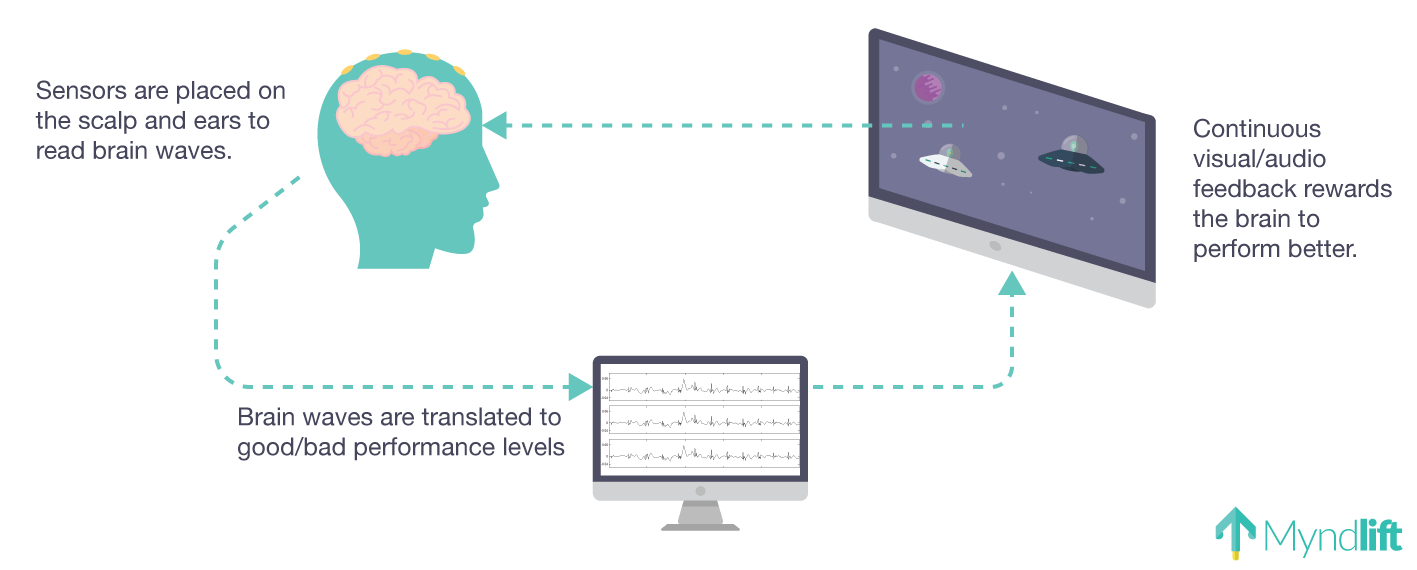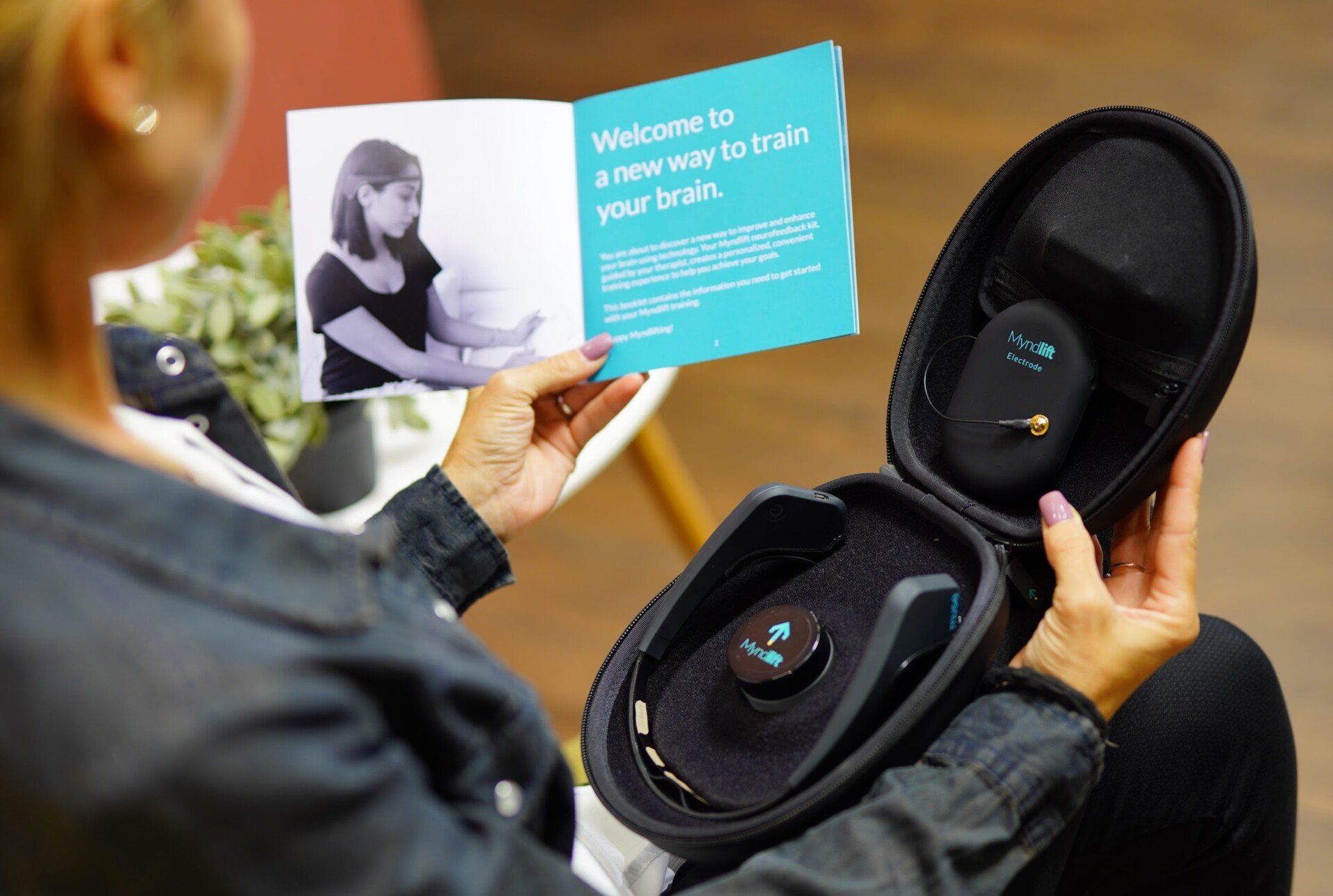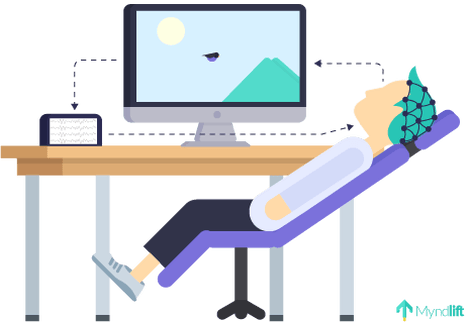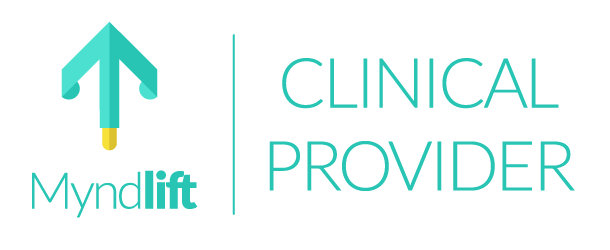Myndlift
What Is Neurofeedback?
Electroencephalography (EEG) neurofeedback is a type of biofeedback therapy which measures and records the brain waves. The user receives visual or auditory feedback which help to train the brain to better regulate its activity. Neurofeedback has been used in clinics around the world for decades, and clinical research has shown it to be effective in treating many neurological conditions with lasting results.
Neurofeedback Therapy From Home
Neurofeedback can be done remotely using a wearable device and a mobile app while your clinician monitors your brain activity and progress remotely. By downloading the Myndlift app and using a Muse headset, you’ll be able to train remotely with close clinical supervision.
What Is Used In The Training?
Myndlift neurofeedback training requires an EEG headset that is placed on the head. Once connected, you can start playing games that are controlled by your brainwaves. Through playing these games, your brain will learn to better regulate itself.
What Is The Evidence Behind Neurofeedback?
Neurofeedback was first discovered in the 1950’s as a form of operant conditioning, in which the brain changes its activities as as result of stimuli, or positive or negative feedback. See more information on research in this webpage.
Myndlift Neurofeedback is therapist-guided, which means clinicians provide personalized supervision, whether in-clinic or remotely.
Research behind Neurofeedback for ADHD
The impact of neurofeedback on ADHD has been studied the most among all neurofeedback therapies. Many studies have been published over the years, we chose few recent ones to show you:
2009
102 children aged 8-12 with an ADHD diagnosis were randomly assigned in two groups- one group did 36 neurofeedback sessions, the other did 36 sessions of computerized attention skills training game.
Findings:
Improvements in the neurofeedback group were superior to the control group. The findings indicated that “neurofeedback effects are substantial and of practical importance. Our results confirm findings of previous neurofeedback studies even under strict control conditions.” The researchers concluded the result “indicates clinical efficacy of neurofeedback in children with ADHD”.
2012
130 children diagnosed with ADHD aged 6-18 were randomly assigned into 3 groups – one received neurofeedback, one received medication (methylphenidate), one received both neurofeedback and medication.
Findings:
The researchers conclude that “NF produced a significant improvement in the core symptoms of ADHD, which was equivalent to the effects produced by MPH (methylphenidate), based on parental reports. This supports the use of NF as an alternative therapy for children and adolescents with ADHD.”
2014
104 children were randomly assigned to receive NF (neurofeedback), cognitive training or a control condition. They were also evaluated 6 months post-intervention.
Findings:
"Neurofeedback participants made more prompt and greater improvements in ADHD symptoms, which were sustained at the 6-month follow-up, than did CT participants or those in the control group. This finding suggests that neurofeedback is a promising attention training treatment for children with ADHD.”
CONTACT
Integrative Psychiatry of Chattanooga
2435 Broad Street
Chattanooga TN 37408
Phone: 423-680-6030
Fax: 423-435-9788
contact@integrativepsychiatrycenter.com
mailto:%20info@infusionketamine.com
mailto:%20info@infusionketamine.com
mailto:%20info@infusionketamine.com
mailto:%20info@infusionketamine.com
Integrative Psychiatry of Chattanooga | Powered by Flypaper | Privacy Policy








